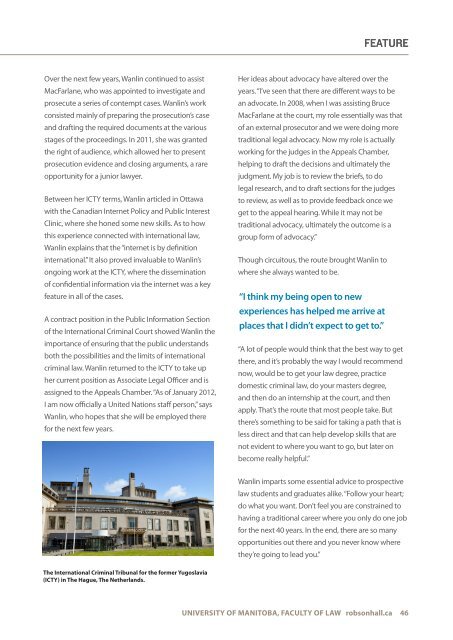downloading the PDF - Robson Hall Faculty of Law
downloading the PDF - Robson Hall Faculty of Law
downloading the PDF - Robson Hall Faculty of Law
Create successful ePaper yourself
Turn your PDF publications into a flip-book with our unique Google optimized e-Paper software.
FEATURE<br />
Over <strong>the</strong> next few years, Wanlin continued to assist<br />
MacFarlane, who was appointed to investigate and<br />
prosecute a series <strong>of</strong> contempt cases. Wanlin’s work<br />
consisted mainly <strong>of</strong> preparing <strong>the</strong> prosecution’s case<br />
and drafting <strong>the</strong> required documents at <strong>the</strong> various<br />
stages <strong>of</strong> <strong>the</strong> proceedings. In 2011, she was granted<br />
<strong>the</strong> right <strong>of</strong> audience, which allowed her to present<br />
prosecution evidence and closing arguments, a rare<br />
opportunity for a junior lawyer.<br />
Between her ICTY terms, Wanlin articled in Ottawa<br />
with <strong>the</strong> Canadian Internet Policy and Public Interest<br />
Clinic, where she honed some new skills. As to how<br />
this experience connected with international law,<br />
Wanlin explains that <strong>the</strong> “internet is by definition<br />
international.” It also proved invaluable to Wanlin’s<br />
ongoing work at <strong>the</strong> ICTY, where <strong>the</strong> dissemination<br />
<strong>of</strong> confidential information via <strong>the</strong> internet was a key<br />
feature in all <strong>of</strong> <strong>the</strong> cases.<br />
A contract position in <strong>the</strong> Public Information Section<br />
<strong>of</strong> <strong>the</strong> International Criminal Court showed Wanlin <strong>the</strong><br />
importance <strong>of</strong> ensuring that <strong>the</strong> public understands<br />
both <strong>the</strong> possibilities and <strong>the</strong> limits <strong>of</strong> international<br />
criminal law. Wanlin returned to <strong>the</strong> ICTY to take up<br />
her current position as Associate Legal Officer and is<br />
assigned to <strong>the</strong> Appeals Chamber. “As <strong>of</strong> January 2012,<br />
I am now <strong>of</strong>ficially a United Nations staff person,” says<br />
Wanlin, who hopes that she will be employed <strong>the</strong>re<br />
for <strong>the</strong> next few years.<br />
Her ideas about advocacy have altered over <strong>the</strong><br />
years. “I’ve seen that <strong>the</strong>re are different ways to be<br />
an advocate. In 2008, when I was assisting Bruce<br />
MacFarlane at <strong>the</strong> court, my role essentially was that<br />
<strong>of</strong> an external prosecutor and we were doing more<br />
traditional legal advocacy. Now my role is actually<br />
working for <strong>the</strong> judges in <strong>the</strong> Appeals Chamber,<br />
helping to draft <strong>the</strong> decisions and ultimately <strong>the</strong><br />
judgment. My job is to review <strong>the</strong> briefs, to do<br />
legal research, and to draft sections for <strong>the</strong> judges<br />
to review, as well as to provide feedback once we<br />
get to <strong>the</strong> appeal hearing. While it may not be<br />
traditional advocacy, ultimately <strong>the</strong> outcome is a<br />
group form <strong>of</strong> advocacy.”<br />
Though circuitous, <strong>the</strong> route brought Wanlin to<br />
where she always wanted to be.<br />
“I think my being open to new<br />
experiences has helped me arrive at<br />
places that I didn’t expect to get to.”<br />
“A lot <strong>of</strong> people would think that <strong>the</strong> best way to get<br />
<strong>the</strong>re, and it’s probably <strong>the</strong> way I would recommend<br />
now, would be to get your law degree, practice<br />
domestic criminal law, do your masters degree,<br />
and <strong>the</strong>n do an internship at <strong>the</strong> court, and <strong>the</strong>n<br />
apply. That’s <strong>the</strong> route that most people take. But<br />
<strong>the</strong>re’s something to be said for taking a path that is<br />
less direct and that can help develop skills that are<br />
not evident to where you want to go, but later on<br />
become really helpful.”<br />
Wanlin imparts some essential advice to prospective<br />
law students and graduates alike. “Follow your heart;<br />
do what you want. Don’t feel you are constrained to<br />
having a traditional career where you only do one job<br />
for <strong>the</strong> next 40 years. In <strong>the</strong> end, <strong>the</strong>re are so many<br />
opportunities out <strong>the</strong>re and you never know where<br />
<strong>the</strong>y’re going to lead you.”<br />
The International Criminal Tribunal for <strong>the</strong> former Yugoslavia<br />
(ICTY) in The Hague, The Ne<strong>the</strong>rlands.<br />
UNIVERSITY OF MANITOBA, FACULTY OF LAW robsonhall.ca 46














